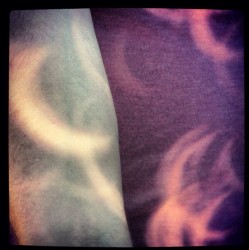What meaning does the symbol of the cross or crucifix still hold, including for those who may not identify themselves as Christian? Does it have anything of value to offer in today's world? I purchased this crucifix shown in the photo while visiting Paris in 2002. On the back is a sticker which reads "Fabrication Francaise". Whenever I look at it, I not only think of the universal meaning of the crucifix but also of the particular place where I found this version of the symbol.
It occurs to me that this paradox of a symbol being both unique and universal is telling us something about what it means to be human. On the one hand, we are more than our egos. When I find myself grasping, resisting, ungrateful, indignant or just plain pissed off at the world, I realize it's time to let go into Something Larger.
I have found Buddhism particularly helpful at such times with its notion of not taking the personal self so personally because even the person we identify with as "myself" is a constantly morphing fabrication of the ego. What is essential is Spirit, Buddha mind, Christ consciousness, Ground of Being, or whatever name you choose to give that Source which animates us and into which we release when this life ends. When caught up in self-pity, self-entitlement, or self-preoccupation, it is into the vast web of Everything-ness that I release (eventually and often after much kicking and cussing).
On the other hand, there is a "me" present in this moment, a unique expression of that Source that will never be repeated. I have passions, insights, talents, desires, flaws and dreams that no other being will ever embody in this combination.
This part is actually harder for me to live. I can more readily surrender into the Light of Being than I can see my particularly wavelength of color in the Light. It is easier for me to chock things up to Mystery and sit with an uncomfortable unknowing than it is to for me to know and act on what is true for me as this one-of-a-kind human being. My deep fear is that I may not be loved or liked when I fully unfurl my hues and tints. Yet without an intimate knowing and passionate expression of who I am, my life is muted and gray. The Light of the World is also diminished, refracting one less color.
This is the cross of being human. One aspect of me is always grateful, irrevocably loved, and, on a deep heart level, belongs to everyone and everything. In that space there is no separation and no fear. Another part of me is defined, has boundaries and has places of belonging and not belonging. It is that space of Oneness, Love and Wholeness that I have the courage to express my uniqueness that may or may not jive with the uniqueness of others.
We are both divine (or Life Essence) in a way that can never be separate or defined from any other part of life. And we are also separate, defined, colorful, individual expressions of the divine. Both are true. The beams of the cross itself, one vertical and one horizontal, symbolize this intersection of the eternal and the temporary. Jesus Christ represents the conscious embodiment of this intersection, this meeting of the holy and the ordinary at the crossroads of humanity. The cross of being human is to live both fully.
